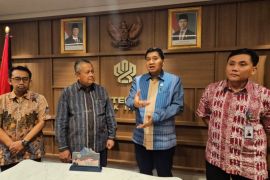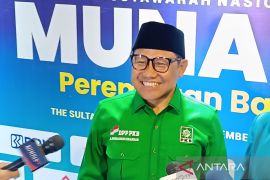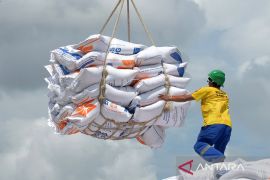"The main objective is to assist the people in increasing their purchasing power. It can be in the form of a cash-for-work program for accelerating economic activities in villages. However, it should not follow the previous program of direct cash assistance, which was provided without clear targets," David Sumual, an economist of publically listed PT Bank Central Asia, stated during a discussion on Wednesday night.
Sumual is of the view that direct funds for labor-intensive programs in villages can restore the peoples purchasing power, which is deemed important as the consumption sector is still one of the main economic drivers in Indonesia.
However, the extension of compensation funds should be based on a clear mechanism and strong supervision to achieve the set targets.
"The use and target of the funds should be clearly identified such as the construction of bridges, educational facilities, and mosques, among others," he remarked.
Sumual explained that the second target of the economic package is to accelerate the absorption of central and regional government budgets. For this purpose, the government should soon issue a presidential regulation on the acceleration of budget disbursement.
The presidential regulation is needed to provide a legal basis, which demarcates matters concerning administration and law, so that the officials executing the funding program would feel safe.
"Many officials are afraid to take a decision as administrative issues could spiral into legal issues. So, a presidential regulation is needed," he pointed out.
In July, the Ministry of Finance recorded that Rp273.5 trillion worth of village funds were still lying idle in banks.
According to Sumual, the third target is the extension of incentives to companies to reduce dividend repatriation to investors overseas. The dividend funds of companies are expected to be allocated as a reinvestment at home.
The repatriation of dividends to overseas investors has been blamed for causing a huge deficit in the income transaction balance. The deficit in the income transaction balance in 2014 stood at US$26 billion, or the biggest contributor to the current account deficit amounting to US$27 billion.
Earlier, Chief Economic Minister Darmin Nasution remarked that the government was planning to announce the second phase of its economic policy package at the end of September 2015. The government had announced the first phase of its economic policy package on September 9, 2015.
Nasution noted that the deregulation process outlined in the economic policy package announced by President Joko Widodo (Jokowi) earlier this week would be completed next week.
The policy package calls for the abolition of several government and presidential regulations and presidential decrees to boost economic growth.
"We will complete the process in the second half of September as the president will return from his visit to the Middle East on Sept. 15," Darmin stated at the Halim Perdanakusumah Airport after bidding farewell to President Jokowi and his entourage, who departed on a four-day visit to several Mideast countries.
He said the process of deregulation is expected to be completed in three days after the return of the president.
He affirmed that the process of deregulation is underway.
"We have urged to accelerate the administrative process, so that it would be completed on Sept. 18," he emphasized.
He revealed that the implementation would start in the third week of September 2015, including monitoring and execution.
The regulations to be included in the deregulation process are related to the development of 14 industrial estates, he cited.
"What is important is implementation. We thoroughly consider all aspects and prepare everything needed," he noted.
In total, 134 regulations issued by 17 ministries/state agencies will be deregulated. These include 17 government regulations, 11 presidential regulations, two presidential instructions, 96 ministerial regulations, and eight other regulations.
Basically, the deregulation strategy is aimed at expanding and opening wider investment opportunities, Darmin affirmed.(*)
Editor: Heru Purwanto
Copyright © ANTARA 2015










